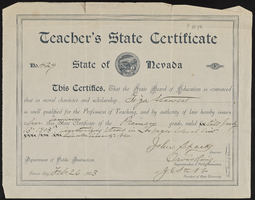Search the Special Collections and Archives Portal
Search Results

Transcript of interview with Jackie MacFarlane by Claytee White, February 4, 2010
Date
Archival Collection
Description
Jacqueline "Jackie" Tilman MacFarlane was born in her grandmother's Las Vegas home at H Street and Clark Ave. Her father John Franklin Tilman was a construction worker at Boulder Dam (now Hoover) in early 1930s. Jackie recalls her family having to move several times the Great Depression and living in rural Nevada. Eventually the family came back to reside in Las Vegas. After graduating from high school, she took a waitress job at the Spot Cafe (Main & Charleston) and then at the Askew Drive-In. It was there that she met her future husband, David MacFarlane, an Air Force cadet. David continued to work at Nellis Air force Base as a civilian until he retired in 1987. Jackie describes raising her children in Fair Circle neighborhood during the 1950s and 1960s; a time when Las Vegas was just a "small town of 50,000." She felt safe and always found work in the casinos. Her work career included being a change girl at the Mint of Fremont St. and working as the front office cashier at the Desert Inn and then working at the Sands Hotel and Casino. Eventually she became a night auditor at Sands Hotel and Casino and then at Sahara Hotel and Casino from 1970-1977. She remembers working nightshift, coming home to get the kids and husband off to school and work. After leaving Sahara, she began selling Vanda cosmetics as a home business, something she still does today.
Text

Paul M. Lytle interview, March 8, 1995 transcript
Date
Archival Collection
Description
Lytle discusses his birth in Salt Lake City, Utah, his early life in Overton, Nevada, moving around the Southwest United States, and returning to Overton in the early 1930s to work with the Civilian Conservation Corps. Subjects Lytle also talks about in the interview include road and campsite construction at the Valley of Fire State Park, stories about associates and relatives, and being enlisted as a male nurse with the United States Army during World War II. Lastly, Lytle talks about the construction of an exhibit building at Hoover Dam (Boulder Dam) originally used as a headquarters for soldiers during World War II to protect the dam.
Text

Olivia Díaz oral history interview: transcripts
Date
Archival Collection
Description
Oral history interviews with Olivia Díaz conducted by Nathalie Martinez and Barbara Tabach on August 31 and September 14, 2020 for the Latinx Voices of Southern Nevada Oral History Project. In the first interview, Díaz gives her family and personal history, growing up in Las Vegas but often visiting her family in Durango, Mexico for extended stays. She recalls her matriarchal upbringing, particularly while living in Mexico, and what life was like growing up and going to school in East Las Vegas and at the University of Nevada Las Vegas (UNLV). Subjects discussed include: Mexico; Latina identity. In the second interview, Díaz talks about her English language education career for the Clark County School District (CCSD) and the events that led her to run for Nevada Assembly and Las Vegas City Council. She is presently Nevada's Assemblywoman for District 11 and Las Vegas' Councilwoman for Ward 3. Olivia concludes her interview with insights into her political and educational goals for the community and the initiatives she has focused on in light of the COVID-19 pandemic.
Text

Transcript of interview with Lyn Robinson by Barbara Tabach, September 18, 2014
Date
Archival Collection
Description
One day in 2012, UNLV student Lyn Robinson spied a posting on the bulletin board for a photographer for the Sperling Kronberg Mack Holocaust Resource Center. She was an art major with a concentration on photography. She was also had a deep appreciation of the horror of the Holocaust and what the survivors she would take photos of had endured. Thus began a two year project, during which she took photos of over sixty survivors. Her images are preserved at UNLV Special Collections & Archives. Prints are displayed at the Sperling Kronberg Mack Holocaust Resource Center. On September 18, 2014, Lyn shared her work for this oral history recording. She is a native of Florida, daughter of a horticulturist father and pianist mother.
Text

Stewart family legal papers and certificates
Date
Archival Collection
Description
Stewart family legal papers and certificates
Text
DeRionne P. Pollard (Nevada State University) oral history interview conducted by Magdalena Martinez and Taylor Cummings: transcript
Date
Archival Collection
Description
From the Lincy Institute "Perspectives from the COVID-19 Pandemic" Oral History Project (MS-01178) -- Education sector interviews file.
Text

Blue Angel Motel Neon Survey document, August 12, 2017
Date
Archival Collection
Description
Site address: 2110 Fremont St
Sign owner: Bartsas Mary 22 LLC
Sign details: Motel was originally constructed c. 1956. Sits on a 2.54 acre site. Property was later changed to Club 2110, but now is vacant.
Sign condition: Unknown - Angel is being repaired by City Centennial Commision and YESCO, and will believed to be placed on medium of Fremont and Charleston once restored. 4 - Arches were repainted at unknown time from original blue to a deep forest green, "Blue Angel" was removed and "Night Club" was put up in blue angels place. "Motel" wording on flag portions of the sign was painted over and replaced with "Club 2110". doesn't have any form of lighting, appears to be in decent condition.
Sign form: Angel - Sculpted Pole Sign/ Monument Sign, Arches: Pole sign with protruding arches on either side. Originally the left side arch would have rested on the Blue Angel motel building, but when it was torn down so was the connection, so it is free hanging off the pole support system.
Sign-specific description: Angel: Pole sign with sculpture of Angel on top. Was internally illuminated, her skin, hair, halow, pole, wand, used to illuminate. Two flag signs hung off of angel pedestal, one read "Motel" other would read "Blue Angel" on opposite sides of the pole. Would of glowed with blue neon. Arches: Repainted by new owner: Arcs protruding on either side of the pole with the words "Night" and "Club" on each other arches. There are flag like components going down the pole support with stars on the opposite side of each component. Slight directional tool of the flags that point downwards to the ground. The stars do not have any lighting system of their own (no neon or bulbs). Each flag component is double sided with painted on graphics.
Sign - type of display: Neon, and internally illuminated plastic
Sign - media: Steel, fiberglass
Sign animation: Possible rotation of the angel?
Sign environment: The property is surrounded by other motels, shopping centers and gas stations
Sign manufacturer: YESCO
Sign designer: Betty Willis
Sign architect of record: C. 1956
Sign - date of installation: C. 1956
Sign - date of redesign/move: Angel - 2014 repaint, 2017 refurbishment, c. 2014 repaint of arches
Sign - thematic influences: Believed that angel was modeled after Marilyn Monroe
Sign - artistic significance: 1950s pop culture themes - Marilyn Monroe and Disney-esque angel
Survey - research locations: Motel site, www.roadarch.com, UNLV photo collections, assessor's website
Surveyor: Danny Jacobs
Survey - date completed: 2017-08-12
Sign keywords: Sculptural; Neon; Steel; Fiberglass; Pole sign; Internally illuminated; Incandescent
Text

Neonopolis Neon Survey document, September 8, 2017
Date
Archival Collection
Description
Site address: 450 Fremont St
Sign owner: Rohit Joshi leases the building from Wirrulla USA Inc.
Sign details: This building was originally constructed in 2001 as a retail store center. This location currently holds a Denny's, a vintage toy store, the Telemundo station office and an international food market. This location also held a movie theater until 2009.
Sign condition: 4.5- Sign still in relatively new looking condition
Sign form: Entrance sign
Sign-specific description: Above the main entrance way into the mall there are the letter "NEONOPOLIS" in plastic back lit signs. Each letter has a lime green border with white strip and then purple for the main color of the block letters. The letter "O" in "polis" is actually an orbit shape that is orange and purple to double as the "O". Portions of the building have neon tubes, some illuminating blue and others are purple, green, red and yellow. There are also different colored shapes of neon spread throughout the building such as yellow triangle as well as orbits showcasing red and yellow neon tubing. Many of the companies in this location have their own signs as well.
Sign - type of display: Plastic back lit sign and neon
Sign - media: Plastic and steel
Sign - non-neon treatments: Plastic back lit portion
Sign environment: This property is on Fremont in between 4th St. and Las Vegas Blvd. Right in front on the building is the Slotzilla machine where people get onto the zipline.
Sign - date of installation: 2002
Sign - date of redesign/move: When the movie theater portion of this location closed in 2009 part of the signage was taken down and in recent years with different companies settling in there have added their own signs.
Sign - thematic influences: The name and the theme of this location being neonopolis showcases the downtown neon vibe particularly since there is a wide variety of neon display surrounding this property.
Sign - artistic significance: Showcasing the different designs with neon shows how true of an art it still is, particularly with the triangle designs and the orbits
Survey - research locations: Asessors page, https://neonjoshiassociate.wixsite.com/mysite-1 Neonopolis website, https://www.reviewjournal.com/entertainment/food/neonopolis-theaters-to-go-dark-thursday-night/ Review Journal article discussing the closure of their movie theater, https://lasvegassun.com/news/2002/may/03/long-awaited-neonopolis-opens-in-downtown-vegas/ Las Vegas Sun article talking about their opening in 2002
Survey - research notes: There used to be an 18 theater movie theater located there which shut down in 2009 and was renovated into clubs, the most recent one to open is called the Nerd.
Surveyor: Emily Fellmer
Survey - date completed: 2017-09-08
Sign keywords: Plastic; Backlit; Neon; Steel; Fascia
Text
Ronzone Family Papers
Identifier
Abstract
Ronzone Family Papers (1900-1991) include newspaper clippings, business documents, correspondence, certificates, yearbooks, publications, artifacts, and photographs. The papers document their lives in Nevada, their department store, and Dick Ronzone's involvement in local politics.
Archival Collection
Walking Box Ranch Photograph Collection
Identifier
Abstract
The Walking Box Ranch Collection (1880-1979, bulk 1930-1945) contains digital images compiled by the University of Nevada, Las Vegas (UNLV) Public Lands Institute. The collection consists of images of the Walking Box Ranch (Searchlight, Nevada), the Mojave Desert, and the Bell Family, consisting of American film stars Rex Bell, Clara Bow, and their children. There are also candid and professional photographs of Rex Bell and Clara Bow taken at various locations, some of which include friends and other family members, as well as a large number of unidentified film stills from Rex Bell movies. Images in this collection are from Bell family photograph albums and assorted prints, and were reformatted into digital images by the UNLV Public Lands Institute.
Archival Collection
